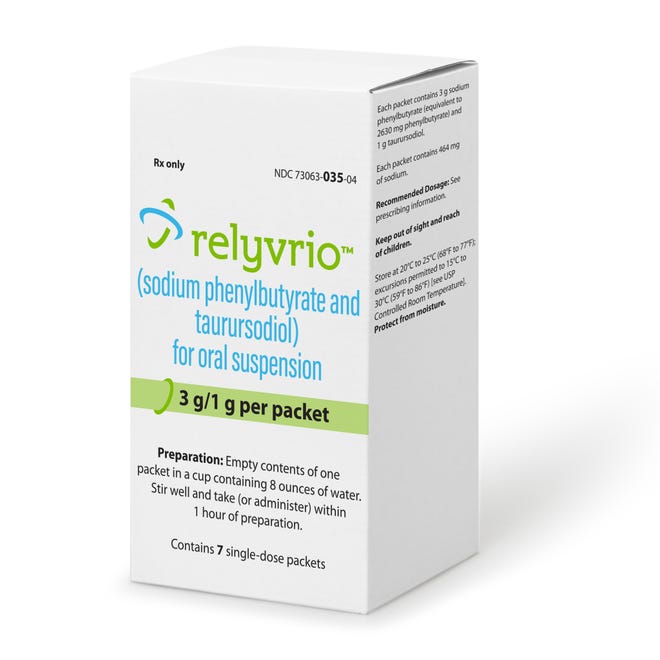SOMERVILLE, Mass. — Bruce Rosenblum knows the drug Relyvrio won’t save his life. It might not even make a difference.
But after using a make-your-own version for months, he stopped being able to get it early this summer and he’s eager to start up again.
Late Thursday, the Food and Drug Administration approved the use of Relyvrio to treat amyotrophic lateral sclerosis, more commonly known as ALS. Rosenblum said he’s thrilled by the decision and immediately requested a prescription for it.
Early trial data suggests the drug is particularly helpful early in the fatal disease that gradually robs people of their ability to control their movement, eventually including breathing.
Rosenblum and others with ALS don’t have a lot of other options.
There are only five other drugs approved to treat ALS, the most recent in 2017, but none has been shown to stop the inexorable loss of muscle control. Only one has been shown in some people to extend life, but by just three months on average.
Data on Relyvrio’s effectiveness remains preliminary. A six-month trial in 137 patients, half of whom received a placebo and half the active drug, suggested Relyvrio could slow the rate of decline. A follow-up found that patients on the active drug lived longer than those who got the placebo.
COMMUNICATING BY THOUGHT:How first-of-its-kind brain implant may help paralyzed New Jersey man
An FDA advisory committee voted in March that the data was too thin to justify approval, but in a second meeting earlier this month, the committee reversed its position and recommended approval. The drug was approved in Canada in June.
A larger trial is due to be completed next year. The company has promised to take Relyvrio off the market if the more definitive study shows the drug doesn’t work.
“We can all agree that this drug is not going to stop the disease in its tracks,” Clive Svendsen, an ALS researcher at Cedars-Sinai in Los Angeles, said before the FDA’s approval. A lot of drugs look promising in small trials, said Svendsen, who was not involved in Relyvrio’s development, because ALS progresses at different rates in different people.
Relyvrio, a combination of two drugs, sodium phenylbutyrate and taurursodiol, apparently works by boosting cell energy and preventing a process that can lead to cell death. It can be taken orally or through a feeding tube.
Common side effects include diarrhea, abdominal pain, nausea and upper respiratory tract infection, but the drug appears relatively safe.
Could Relyvrio be a ‘life-changing drug’ for people with ALS?
Rosenblum, 63, a computer software entrepreneur who was diagnosed with ALS in 2017, said he’s willing to try just about anything that promises to delay his decline.
A study published two years ago brought Relyvrio to the attention of many ALS patients. Back then, Rosenblum’s doctor tried to prescribe him sodium phenylbutyrate, which was already FDA-approved to treat a different rare condition, but his insurance company denied coverage.
Self-paying through a specialty drugstore would have run him $8,400 a month, but he was able to find a nearby compounding pharmacy that could make it for $1,050. “That I can stomach,” he said. Taurursodiol is available as an inexpensive supplement.
He took the combination daily from last September until May, when the prescription ingredient was suddenly no longer available. “Right now, I have no idea when I’m going to get it again,” Rosenblum said. “I’ve used up all I had, as have most patients I know. We’re all waiting.”
Despite the limited evidence for effectiveness, Rosenblum said the ALS patient community has been eager for Relyvrio’s approval and frustrated by the advisory committee’s earlier rejection of the drug. With the typical patient living just 2 to 5 years after diagnosis, even a few months can make a huge difference, said Rosenblum, who lost two friends with the disease this summer.
Patients and advocates spoke at the FDA advisory committee hearing in early September, asking the agency to approve Relyvrio, because they have so few options.
Vance Burghard told the committee that in 2017 he needed help pulling up his pants and couldn’t lift his arms high enough to put on a T-shirt. He needed a wheelchair to get to his doctor’s appointments and had to stop stocking shelves and helping customers at the store where he worked.
By the end of 2018, after taking the drug, then called AMX0035, he no longer needed a wheelchair and was able to travel again with his wife, walking “many miles” through parts of Europe, China and Tibet.
“AMX0035 for me has been a life-changing drug,” Burghard said, adding that his condition has been stable for three years. “I ask that you quickly approve it for the treatment of ALS so others afflicted with this disease can benefit from it.”
Patients need whatever help they can get, others said.
“This is a great thing for our community. We haven’t seen (many) successes,” said Dr. Jinsy Andrews, director of neuromuscular clinical trials at Columbia University, and a researcher on the Relyvrio trial. “Anything that has a good safety and tolerability profile and can buy any amount of time is acceptable for someone living with ALS.”
When will Relyvrio be available, and how much will it cost?
Amylyx Pharmaceuticals, the Cambridge, Massachusetts-based company that makes Relyvrio, promised to make it available within about six weeks, the same timeframe as after it was approved in Canada.
Co-CEO Justin Klee said before the approval that he expects patients will eventually take several drugs, including Relyvrio to slow their disease progression. “ALS is a complex, multifaceted disease,” he said, so different approaches will be needed to treat it.
What started as a scientific insight has now turned into a mission for Klee and his co-CEO Josh Cohen. “It’s hard to work in an area like ALS and not feel both passionate every day but also feel like we’re not doing enough,” Klee said. “Now that we have a platform to really drive needed change, we feel like we have a deep responsibility to do so. We also hope this is just the start.…Our treatment, we think there’s great data supporting it, but it’s not a cure. We need to keep pushing.”
In a statement late Thursday, the company pledged to price Relyvrio below the last approved ALS drug, Radicava (edaravone) which can cost upwards of $180,000 a year.
Rosenblum can’t prove the drug cocktail made a difference in the progression of his disease, but said he’s lost strength in his right arm faster in the few months since he stopped getting sodium phenylbutyrate. He drives his wheelchair and uses his computer mouse with his right arm, so his quality of life really depends on strength in that arm.
“If nothing else, it’s frustrating,” to not have had access to Relyvrio, he said. “It’s frustrating for me, it’s frustrating for everyone else who’s been on this, because we all tend to believe this is probably the best thing facing FDA approval ever.”
Contact Weintraub at kweintraub@usatoday.com
Health and patient safety coverage at USA TODAY is made possible in part by a grant from the Masimo Foundation for Ethics, Innovation and Competition in Healthcare. The Masimo Foundation does not provide editorial input.



